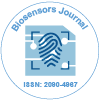Our Group organises 3000+ Global Events every year across USA, Europe & Asia with support from 1000 more scientific Societies and Publishes 700+ ������ Journals which contains over 50000 eminent personalities, reputed scientists as editorial board members.
������ Journals gaining more Readers and Citations
700 Journals and 15,000,000 Readers Each Journal is getting 25,000+ Readers
Indexed In
- Index Copernicus
- Google Scholar
- Genamics JournalSeek
- RefSeek
- Hamdard University
- EBSCO A-Z
- OCLC- WorldCat
Useful Links
Recommended Journals
Related Subjects
Share This Page
Interfacial effects and charge carrier chemistry in lithium electrolytes
4th International Conference on Electrochemistry
Jelena Popovic
Max Planck Institute for Solid State Research, Germany
Keynote: Biosens J
DOI:
Abstract
Lithium electrolytes that link high ionic conductivities with high lithium transference number are rare, and believed to be essential for functional high power batteries. One effective way to prepare such materials is by engaging an interfacial effect on an oxide surface in order to demobilize the anion in liquid/solid electrolytes. The galvanostatic polarization experiments as well as the influence of surface area, salt concentration and temperature on their outcome will be discussed in details. Furthermore, significance of interfacial effects in other ionic devices will be touched upon. Rather than just facilitating high performance materials, liquid/ solid electrolytes are a fruitful playground for fundamental understanding of the electrical double layer. A model glyme on muscovite mica system is a starting point for tackling the issue of ion-ion correlations in concentrated electrolytes and its effect on the Debye lengths estimated from the surface force measurements. Finally, solid polymer lithium electrolytes can be used in bilayer graphene gating experiments. Here, the electrolyte plays a vital role in the direct measurement of the high lithium diffusion coefficient. Recent Publications 1. Pfaffenhuber C, G�?¶bel M, Popovic J and Maier J (2013) Soggy-sand electrolytes: status and perspectives. Physical Chemistry Chemical Physics 15(42):18318-35. 2. C Pfaffenhuber, F Hoffmann, M Fr�?¶ba, J Popovic and J Maier (2013) Soggy sand effects in liquid composite electrolytes with mesoporous materials as fillers. Journal of Materials Chemistry A 1(40):12560-67. 3. J Popovic, G Hasegawa, I Moudrakovski and J Maier (2016) Infiltrated porous oxide monoliths as high lithium transference numbers. Journal of Materials Chemistry A 4(19):7135-40. 4. F Bella, J Popovic, A Lamberti, E Tresso, C Gerbaldi and J Maier (2017) Interfacial effects in solid-liquid electrolytes for improved stability and performance of dye-sensitized solar cells. ACS Applied Materials and Interfaces 9(43):37797-37803. 5. M K�?¼hne, F Paolucci, J Popovic, P M Ostrovsky, J Maier and J H Smet (2017) Ultrafast lithium diffusion in bilayer graphene. Nature Nanotechnology 12:895-900.Biography
Jelena Popovic is a Scientist at the Max Planck Institute for Solid State Research in Stuttgart, Germany since 2011. Her academic background includes a degree in Chemical Engineering from the University of Belgrade, Serbia in 2008 and a PhD in Colloid Chemistry from University of Potsdam/Max Planck Institute for Colloids and Interfaces in Potsdam, Germany in 2011. Her scientific interests range from new materials and transport mechanisms in ionic materials to soft matter electrochemistry and sustainable synthesis of nanomaterials.
Email:popovic@fkf.mpg.de
